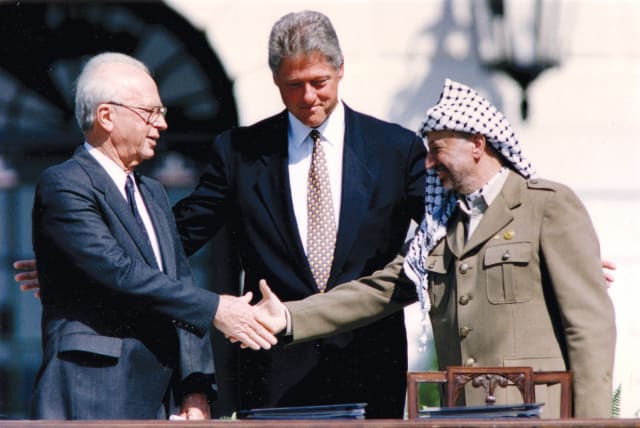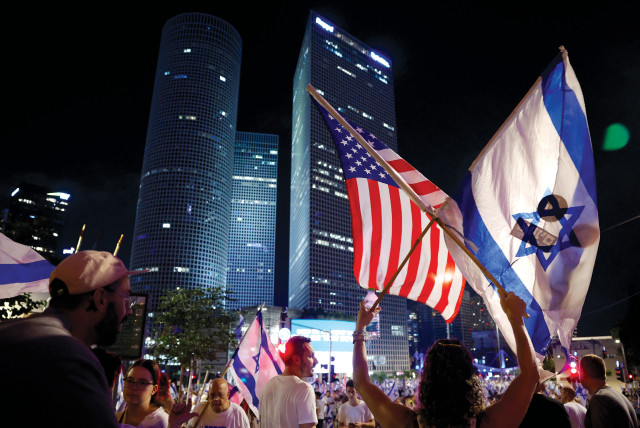Settler goals can't coexist with a Jewish-majority democracy - opinion

The assassination of Yitzhak Rabin sent a message to the liberal front: Peace with your neighbors means war with your brothers.
Most Israelis above a certain age remember exactly where they were on November 4, 1995, when prime minister Yitzhak Rabin was shot at a rally in Tel Aviv by Yigal Amir, an ultra-nationalist Israeli. I am not one of them. I was three years old, still in my birth country of South Africa and two decades away from making aliyah. But, as history shows, in the fall of 1995 supporting the Oslo Accords – which broke a generations-long impasse by giving a measure of self-governance to Palestinians in the West Bank and Gaza – felt to most Israelis like a necessity.
Thirty years ago, on September 13, 1993, Rabin signed the first Oslo Accords with Palestinian leader Yasser Arafat at the White House. Then on September 28, 1995, just months before his assassination, Rabin signed the second Oslo agreement with Arafat in Taba, Egypt
Israel was experiencing seething opposition. For months, spokespeople from the settlement movement had been vehemently criticizing Rabin’s government and mobilizing protesters, some openly advocating for Rabin’s elimination. Notably among them was a young Itamar Ben-Gvir.
Many on the religious Right opposed the idea of ceding land to Arabs, viewing it not only as a political mistake but also a religious transgression. Yigal Amir, the man responsible for Rabin’s assassination, informed the commission investigating the murder, “If I didn’t have support, I wouldn’t have taken action.” By “support,” he revealed that he meant endorsements from extremist rabbis who asserted that ceding land to Arabs violated religious law and that those responsible should face execution. To the more devout members of the Right, Rabin was not merely a traitor but also an apostate – a rebel against God.
If God wasn’t sufficient enough to persuade the more moderate and secular members of the Right that Rabin was a traitor, the Palestinian resistance to the peace process, which triggered an increase in terror attacks, certainly was.
Rabin’s assassination cast a pall over Israel, where everything seemed surreal. It triggered an outpouring of tears and appeals for dialogue, healing, and, most importantly, unity. Little did those who supported the Oslo Accords realize that these calls would ultimately be used against them, becoming tools of their political downfall. In the years following Rabin’s death, the religious Right, staunch opponents of peace with the Palestinians, rose to prominence in Israeli politics. Meanwhile, champions of reconciliation, who had once been the country’s dominant political force, found themselves sidelined. This outcome was unthinkable at the time. The murder of the prime minister, a revered war hero and former chief of staff, by a right-wing extremist might have been expected to galvanize his supporters and weaken his opponents, many of whom were seen as having contributed to the atmosphere that led to the assassination. But this was not to be the case.
What followed was the implosion of the Israeli Center-Left, which was not solely due to Rabin’s murder nor solely from the failure of the peace process, but from something deeper. After Rabin’s death, the opponents of peace quickly distanced themselves from the assassin and pleaded for national unity. Many on the Left wanted to believe that the national trauma from the assassination had induced a contrition of sorts. But the imperative of unity was invoked mainly to stifle reaction and criticism: This meant that the Right could not be held accountable for inciting violence against Rabin, that its leaders were not answerable for their tactics, and that the religious authorities who sanctioned the assassination would not be prosecuted. Some shamelessly argued that the peace process had aggravated the country’s divisions, as if to blame Rabin for his own murder. Above all, the call for unity demanded that the assassination not be “politicized,” which meant that the assassin’s openly political cause—derailing the peace agreement—could not be mentioned.
I don’t want to mislead. While I believe it is a reasonable assumption to think Rabin would have been re-elected in 1996, it is just as reasonable to assume he would not have been able to reach a final status agreement with the Palestinians.
Nonetheless, the assassination sent a message to the liberal front: Peace with your neighbors means war with your brothers. Paralyzed by the continual threats of fraternal war and unable to resist the Right’s unity offensive, liberal Israelis surrendered the ability to define one of the nation’s most fateful events. Public rage evolved quickly into a sentimental theater of grief. Melancholy ballads sung over candles became the trademark of Rabin’s younger mourners, who became known as “the candle youth.” Stripped of causes and consequences, his assassination and legacy were effectively purged of their political significance; the extremists who imposed their will by threat of force were no longer seen as the offenders, while those who criticized them and promoted peace policies were labeled traitors.
Peace with Palestinians means war with the Israeli Right
Hence, it should be no surprise that at the current pro-government rallies advocating for the judicial overhaul, participants, predominantly from the settlements, label their adversaries as traitors. They can be seen donning T-shirts, distributing stickers, and displaying signs that celebrate Rabin’s assassin. This sentiment underscores the profound and inherent link between the events of 1995 and 2023, between the overhaul itself, the aspiration to change the situation on the ground from occupation to annexation, and the damage inflicted upon the democratic framework of the State of Israel.
The Oslo process and later the disengagements were actions that the settlement movement began to view as betrayals by the state of their perceived historical mission to settle the entire land. What started as a small group of idealistic religious farmers half a century ago has now evolved into an extensive network of councils and youth movements displaying behaviors reminiscent of proto-fascism. In the past, the state was seen as a sacred vehicle for settlers to expand Israel into the territories; but since the 1990s, it has become the obstacle to their expansionist ambitions. Today’s settlement movement recognizes that achieving territorial expansion requires a fundamental transformation of the State of Israel itself. This transformation entails molding the state’s institutions to mirror the settler enterprise and establishing a governance system that significantly departs from democracy. The restructuring of the judiciary is just the initial step toward realizing this objective.
Likewise, when MKs call anti-overhaul protesters traitors, they mean it. Just as they meant it with Rabin. Except they don’t mean traitors of the State of Israel that has existed for 75 years but traitors of a different Israel, one that has only ever existed in their imaginations – until now.
Many believe that this government won’t last beyond the first six months of 2024. Whenever it happens, if the coalition collapses, it will likely be followed by appeals for “brotherly unity,” reminiscent of 1995. Once more, the rest of Israelis will be expected to simply forget all the hostility directed toward them, their rights, and the state. Those who resist these appeals will be labeled as enemies, while those who heed them will soon discover that this brand of “unity” will be just as one-sided and short-lived as it was in the past. If indeed the opposition leaders stand for a Jewish-democratic state, then continuous discussions about values are empty. Relying on a meaningless-centrism or assuming that defeating Netanyahu and his coalition requires offering a more polite, “civilized” and non-corrupt version of his politics is now more irrelevant than ever. The central tenet of the centrist argument revolves around the notion of seizing the current crisis as an opportune moment to draft a constitution for Israel. While the prospect of such a constitutional document may indeed be necessary for the country’s future, it is imperative to recognize the complexities that often escape the purview of those advocating for its creation.
In contemplating the scenario where Israel embarks on the path of constitution-making while leaving the thorny issue of borders unresolved, a crucial question arises: To whom and where does this constitutional authority apply?
Shall the constitutional authority extend exclusively to Israeli citizens residing within the recognized sovereign territory of the state – i.e., excluding the settlements in the West Bank? If that were the case, it raises the unsettling prospect of granting settlers a de facto right to disregard the constitutional authority of the state to which they belong. It would be a curious arrangement, where citizens living outside the sovereign borders are, in essence, exempt from the fundamental principles enshrined in the constitution.
Conversely, if the constitutional authority is extended beyond the Green Line, the complications only multiply. To whom does it extend, then? Is it confined to those living within the main settlement blocs adjacent to Israel’s sovereign territory? What about those who have established settlements deeper within the West Bank, beyond the security barrier? And what about the contentious issue of illegal outposts?
If such a comprehensive extension of civil authority is enacted deep into the West Bank, should the Palestinians in those areas also fall under its jurisdiction? If so, it begs the question of whether this is merely another convoluted legal system designed to grant settlers equal legal status to those residing in Israel proper. If so, does this inadvertently signify a de facto annexation of those specific regions? What does this mean for the Palestinians? If an unequal legal system is enshrined, then what was the point of establishing a constitution?
These are questions that cannot be taken lightly, and they underscore how the constitutional endeavor in the context of Israel’s unique challenges is inexorably intertwined with the intractable questions of borders and settlements.
This is the paradox that Israeli society will confront. Acknowledging this reality entails accepting that the goals of the settlement movement cannot coexist with the Zionist vision of a Jewish-majority democratic state. This incompatibility exists not only in demographic, political, and institutional terms but also in matters of values.
The current government has set the state on an inevitable collision course. It’s a situation where over the long term, either the West Bank settlement movement will shape the state according to its own image or the State of Israel will put an end to the West Bank settlement movement. ■
Jerusalem Post Store
`; document.getElementById("linkPremium").innerHTML = cont; var divWithLink = document.getElementById("premium-link"); if (divWithLink !== null && divWithLink !== 'undefined') { divWithLink.style.border = "solid 1px #cb0f3e"; divWithLink.style.textAlign = "center"; divWithLink.style.marginBottom = "15px"; divWithLink.style.marginTop = "15px"; divWithLink.style.width = "100%"; divWithLink.style.backgroundColor = "#122952"; divWithLink.style.color = "#ffffff"; divWithLink.style.lineHeight = "1.5"; } } (function (v, i) { });

